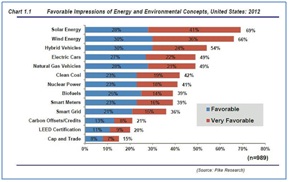Despite the continued build-out of smart grids and deployments of smart meters, many American consumers are not well-informed about utility infrastructure advancements, according to the results a recent survey.
“The Energy & Environment Consumer Survey,” conducted by Boulder, Colorado-based Pike Research (News - Alert), asked more than 1,000 U.S. adults to gauge their own level of awareness of key energy technologies, and to rank their level of support for each.
According to Pike, “Despite efforts to educate consumers about the benefits of clean energy technologies, attitudes around these topics— which will be key to the proliferation of these technologies into the mass market – are slow or difficult to change.”

Interestingly enough, the favorability rating for smart grid infrastructure varies by education level, gender, and income. Those respondents who had household incomes between $75,000 and $125,000 held a 48 percent favorability rating for the smart grid, while those who earned less than $35,000 a year had a 27 percent favorability rating.
In addition, 41 percent of men reported a favorable impression of smart grid technology versus 29 percent of women.
Within the education segment, there was a 23 percentage-point difference in favorable impressions of the smart grid between respondents with the lowest education levels (25 percent) and those with the highest education levels (48 percent). These patterns are very close to the ones seen in previous years.
In addition to smart grids and smart meters, the poll listed 11other key energy topics—solar, wind, clean coal, nuclear, hybrid vehicles, natural gas cars, biofuels, electric cars, carbon offset/credits, cap and trade, and LEED certification. Overall, respondents provided the following key ratings:
More than two-thirds of respondents (69 percent) favored the concept of solar energy, which led all concepts in favorable responses
Solar and wind energy were recognizable to most consumers (fewer than one-quarter of respondents chose the unfamiliar/neutral response option)
Solar energy and LEED certification garnered the smallest percentage of negative responses (seven percent and eight percent, respectively).
Consumers were the least familiar with LEED certification; nearly three-quarters of respondents reported that they were not familiar with or neutral on the concept
Cap and trade received the fewest favorable responses (only 15 percent
Nuclear power, cap and trade, and carbon credits/offsets garnered the most unfavorable reactions with 20 percent, 19 percent, and 19 percent respectively.
While the clean energy and transportation concepts received high levels of favorable responses and low levels of unfamiliarity, consumer views on the smart grid and smart meters remain less positive and more uncertain. About 36 percent of respondents stated their opinions of smart grids were favorable or very favorable—which is about half of the favorability rating for solar energy.
The percentage of unfavorable responses to the smart grid was similar to that of solar energy (eight percent). Perhaps most telling is that 56 percent of respondents were either neutral or had no opinion on the concept of smart grids.
Thus, the analysts recommend that, despite the low level of unfavorable responses, utilities upgrading their infrastructure to include smart grid capabilities must do a better job of educating consumers about the benefits the smart grid can provide.
Want to learn more about the latest in communications and technology? Then be sure to attend ITEXPO Miami 2013, Jan 29- Feb. 1 in Miami, Florida. Stay in touch with everything happening at ITEXPO (News - Alert). Follow us on Twitter.
Edited by
Brooke Neuman